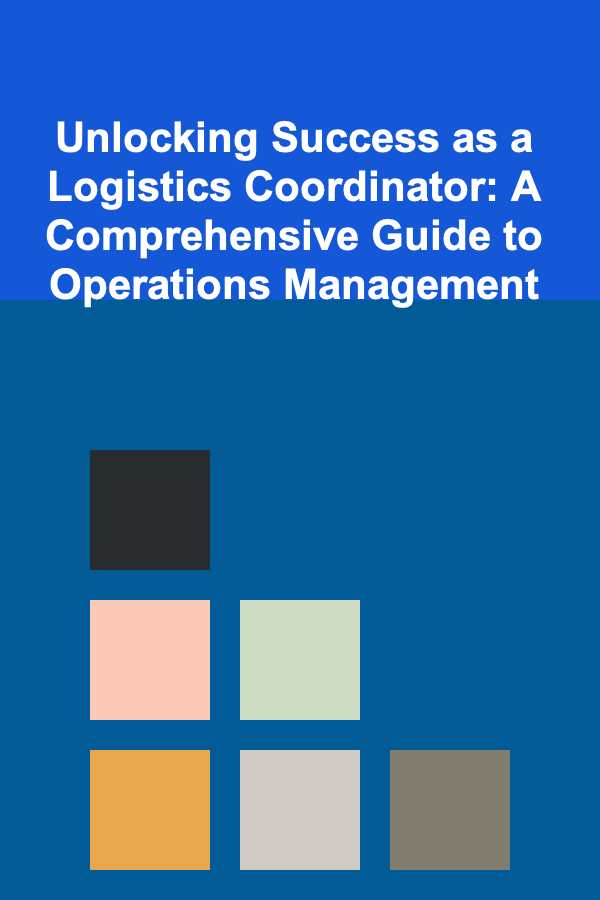
Unlocking Success as a Logistics Coordinator: A Comprehensive Guide to Operations Management
ebook include PDF & Audio bundle (Micro Guide)
$12.99$5.99
Limited Time Offer! Order within the next:

In today's interconnected global economy, logistics coordinators play a pivotal role in ensuring that the flow of goods is seamless, efficient, and cost-effective. Whether it's manufacturing, retail, or e-commerce, logistics is a key function that connects suppliers, customers, and every step in between. A successful logistics coordinator is not only someone who keeps goods moving but also someone who adds strategic value to the entire supply chain process.
This comprehensive guide delves into the critical aspects of being a successful logistics coordinator. From understanding key responsibilities to mastering essential tools and strategies, this guide will equip you with the insights needed to thrive in operations management.
Understanding the Role of a Logistics Coordinator
A logistics coordinator is responsible for overseeing and managing the end-to-end process of moving goods from point A to point B. This includes transportation, inventory management, route planning, order tracking, and ensuring that shipments arrive on time, in good condition, and at the lowest possible cost.
Core Responsibilities
- Order Management: Processing orders, monitoring progress, and ensuring that everything aligns with customer expectations.
- Route Planning & Scheduling: Optimizing transportation routes to ensure timely deliveries while minimizing costs.
- Vendor and Supplier Relations: Coordinating with vendors and suppliers to ensure timely procurement of goods and services.
- Inventory Management: Keeping track of inventory levels to avoid stockouts or excess stock.
- Documentation & Compliance: Ensuring all shipping documents, invoices, and customs paperwork are accurate and meet regulatory standards.
- Problem Resolution: Handling issues that may arise during transportation, such as delays, damages, or shortages.
Key Skills for Success
- Attention to Detail: The logistics process involves numerous moving parts, and a small mistake can lead to significant disruptions. Successful coordinators are meticulous in managing data, inventory, and shipments.
- Analytical Thinking: Logistics coordinators need to assess data and make informed decisions. Analyzing shipping routes, costs, and delays is crucial to making strategic improvements.
- Communication Skills: Being able to effectively communicate with vendors, suppliers, and internal teams is crucial for smooth operations.
- Problem-Solving: When issues arise (and they will), logistics coordinators must come up with fast and effective solutions to minimize disruption.
Actionable Tip:
Develop a checklist or digital dashboard that allows you to keep track of every part of the logistics process. This will help you stay organized and on top of your responsibilities.
Building a Strong Foundation in Supply Chain Management
While logistics coordination is often seen as a standalone function, it's crucial to view it within the broader context of supply chain management. A holistic understanding of how logistics fits into the larger supply chain system will allow you to identify bottlenecks, reduce inefficiencies, and make strategic decisions that benefit the entire organization.
Key Elements of Supply Chain Management
- Procurement: The process of sourcing materials, goods, or services required to fulfill customer demands. Logistics coordinators often collaborate with procurement teams to ensure that products are available when needed.
- Production: Coordinating with manufacturing teams to ensure that raw materials are delivered on time and that the finished products are available for shipment.
- Distribution: Managing the flow of goods from the production facility to the customer. This includes warehousing, inventory management, and transportation.
- Customer Service: Ensuring that customer expectations are met by providing accurate delivery times, responding to queries, and resolving issues when they arise.
Strategic Importance of Supply Chain Visibility
A core principle of supply chain management is visibility. When you have a clear understanding of every step in the process, from procurement to delivery, you are better equipped to make proactive decisions and quickly address disruptions.
Actionable Tip:
Work with cross-functional teams, including procurement, production, and customer service, to build a comprehensive supply chain map. Regularly update this map as processes or technologies change.
Mastering Distribution and Transportation Management
As a logistics coordinator, you will spend a significant amount of time optimizing distribution and transportation strategies. Effective distribution ensures that goods are delivered to customers promptly and at a reasonable cost, which can greatly enhance customer satisfaction.
Types of Distribution Systems
- Direct Distribution: Directly shipping goods from the manufacturer to the end customer, often used in e-commerce and direct-to-consumer models.
- Indirect Distribution: Using intermediaries, such as wholesalers or retailers, to distribute goods to customers.
Transportation Methods
- Ground Transport: Trucks and rail systems are commonly used for regional and national shipments. This method is cost-effective but can be slower.
- Air Freight: For time-sensitive deliveries, air transport is the fastest method, though it comes with a higher cost.
- Sea Freight: Ideal for international shipping and large quantities, sea freight is the most cost-effective for bulk goods, though it's the slowest mode of transport.
- Intermodal Transport: A combination of various transport modes, such as using rail and trucks together, to optimize cost and time efficiency.
Actionable Tip:
Conduct a thorough cost-benefit analysis for each mode of transport based on your business needs. For time-sensitive products, prioritize air freight; for bulk shipments, opt for sea freight or intermodal transport to reduce costs.
Leveraging Technology to Enhance Logistics Operations
Technology plays a critical role in modern logistics management. From tracking shipments to optimizing routes, logistics software can greatly improve the efficiency and accuracy of operations.
Essential Technologies for Logistics Coordination
- Warehouse Management Systems (WMS): These systems allow you to track inventory in real-time, manage storage space, and optimize picking and packing processes.
- Transportation Management Systems (TMS): TMS software helps to optimize routes, monitor shipments, and reduce transportation costs by choosing the most efficient carriers and routes.
- Enterprise Resource Planning (ERP): Integrating logistics with other business functions like finance, procurement, and human resources, ERPs offer a comprehensive view of operations.
- Real-Time Tracking: Using GPS and RFID technologies, logistics coordinators can track shipments in real-time, providing visibility and the ability to make adjustments as needed.
Actionable Tip:
Invest in integrated logistics technology that includes WMS and TMS to help automate processes, reduce human errors, and improve decision-making. Using cloud-based platforms can further increase flexibility and accessibility across your team.
Optimizing Inventory Management
Inventory management is crucial to a successful logistics operation. Poor inventory management can lead to excess stock or stockouts, both of which can be costly to the business.
Key Inventory Management Strategies
- Just-in-Time (JIT) Inventory: JIT is an inventory strategy where goods are ordered and received only as they are needed. This minimizes inventory holding costs and improves cash flow.
- Safety Stock: Having a safety buffer of critical items ensures that you can meet customer demand during unforeseen delays or supply chain disruptions.
- ABC Analysis: Categorizing inventory based on its value and demand allows logistics coordinators to prioritize the management of high-value and high-demand items (A-items), while focusing less effort on low-value, low-demand items (C-items).
Actionable Tip:
Implement an inventory tracking system that automatically alerts you when stock levels are low. This will help you make timely procurement decisions and avoid unnecessary stockouts.
Mitigating Risks and Managing Disruptions
In logistics, disruptions are inevitable. Whether due to natural disasters, supply chain failures, or transportation issues, a logistics coordinator must be prepared to handle unexpected events with agility and resilience.
Common Risks in Logistics
- Natural Disasters: Events such as floods, earthquakes, or storms can disrupt transportation and damage goods.
- Supply Chain Interruptions: Supplier delays or production stoppages can affect the timely delivery of goods.
- Transportation Disruptions: Issues such as strikes, vehicle breakdowns, or accidents can cause delays in delivery schedules.
Risk Mitigation Strategies
- Diversified Supplier Base: Don't rely on a single supplier. Having multiple suppliers for critical goods ensures that you have alternatives if one fails.
- Contingency Planning: Develop a clear plan for dealing with potential disruptions, including backup transportation providers, alternative routes, and communication protocols.
- Insurance: Ensure that shipments are adequately insured to protect against potential damages, theft, or other losses.
Actionable Tip:
Regularly review and update your contingency plans. Build relationships with multiple logistics providers and suppliers to increase flexibility in times of disruption.
Conclusion
Becoming a successful logistics coordinator requires a combination of operational knowledge, strategic thinking, and the ability to adapt to an ever-changing environment. By understanding the core responsibilities of the role, mastering supply chain management, optimizing transportation and distribution, leveraging technology, and mitigating risks, you can ensure smooth and efficient logistics operations.
The key to success lies in staying organized, continuously improving processes, and maintaining strong relationships with suppliers, customers, and internal teams. With the right skills and mindset, you can drive greater efficiency, reduce costs, and contribute to the overall success of your company's logistics operations.

How to Build a Time Management Checklist for Evaluating Your Productivity
Read More
How to Create a Rustic Holiday Look with Farmhouse Decorations
Read More
How to Manage Pet Odors in Your Home
Read More
How to Soundproof a Basement for a Peaceful Environment
Read More
How to Find Serenity in the Fjords of Chile
Read More
How to Build a Home Energy Management System
Read MoreOther Products

How to Build a Time Management Checklist for Evaluating Your Productivity
Read More
How to Create a Rustic Holiday Look with Farmhouse Decorations
Read More
How to Manage Pet Odors in Your Home
Read More
How to Soundproof a Basement for a Peaceful Environment
Read More
How to Find Serenity in the Fjords of Chile
Read More